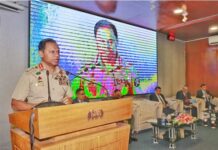
AHM KHAIRUZZAMAN
Abul Kalam Azad and Anwar Ali from Rajshahi
 As a mayor of Rajshahi city, Khairuzzaman Liton did everything, in impressive manner, to get re-elected.
As a mayor of Rajshahi city, Khairuzzaman Liton did everything, in impressive manner, to get re-elected.
But the Awami League-backed candidate lost by a wide margin due to the anti-government sentiment, fuelled by a religion-based campaign and non-cooperation from his own party men.
His defeat proved how a performer can be rejected by his voters even after giving him credit for changing the entire look of Rajshahi city during his five-year term.
For the 18-party-backed Mosaddek Hossain Bulbul, it was a big win considering his position as a low-profile BNP leader.
Many BNP leaders and workers had not even expected such a victory against one of the best performing mayors in the country.
Coming out of the country’s traditional political culture, Liton tried to work with all parties by taking a neutral look on every issue, right from awarding tenders for development works and maintaining a congenial atmosphere at the educational institutes.
Unfortunately, that too boomeranged against him.
Party leaders and workers, who had high expectation of getting benefits from Nagar Bhaban, were disheartened.
Liton awarded most of the big tenders to newcomers in the party, ignoring senior and dedicated party men.
He also did not favour grassroots activists while providing benefits as he wanted to stay away from politicisation, one of his election pledges.
All such moves went against him and he was deserted by many.
From beginning to end, there was a half-hearted campaign for Liton against an aggressive electioneering campaign for Bulbul by an allied force of BNP-Jamaat-Shibir and other religion-based parties.
AL-Chhatra League-Jubo League and some leftist parties started campaigning for Liton only a week before the poll. But it never acquired momentum due to lack of sincerity among them.
The Daily Star talked to dozens of voters, political leaders and analysts since Saturday and got the impression that there was no question about Liton’s performance.
The religious campaign, launched since the flushing out of the Hefajat men from Motijheel on the night of May 5, played a crucial role in the election as it portrayed the AL government to be anti-Islamic and anti-Quran-Sunnah, they believe.
“We can see the development activities of Liton…But all went futile due to the influence of national political issues,” said a voter of Kadirganj.
Prof Abul Kashem of Rajshahi University said, “It is a total rejection of the government for a number of issues, including share market scandal, BDR carnage and of course the issue of religion.”
Explaining the defeat, an AL lawmaker, who was involved in Liton’s election campaign, said, “There was no serious campaigning for Liton. There were not even party people at many polling centres to seek votes for him.”
In terms of spending money, Liton was far behind Bulbul, he added.
ABDUL KHALEQUE
Pankaj Karmakar and Zahid Hossain from Khulna
 Strong opposition from the Jamaat-e-Islami, internal feud, personal behaviour and poor response from migrated and minority voters are believed to be the reasons behind Awami League-backed candidate Talukder Abdul Khaleque’s defeat in the Khulna City Corporation polls.
Strong opposition from the Jamaat-e-Islami, internal feud, personal behaviour and poor response from migrated and minority voters are believed to be the reasons behind Awami League-backed candidate Talukder Abdul Khaleque’s defeat in the Khulna City Corporation polls.
The participation of a leader of the Jatiya Party, a component of the AL-led grand alliance, in the election as a mayoral candidate also acted as a supplementary reason.
In addition to these, the use of the religion card by Islamist parties and organisations also contributed to his defeat.
Several local AL men noted that at the previous mayoral election Khaleque had maintained good relations with Jamaat leaders, which helped him win the polls. But this time no Jamaat vote was cast in his favour, they claimed.
“Besides, the Jatiya Party candidate also cost us some votes. If he [JP candidate] along with his supporters had worked for him, it would be better,” said a Jubo League leader in Khulna.
To add insult to injury, national issues like the war crimes trial, Padma Bridge and other scams appeared as a major setback as they did not have proper answers to those issues, insiders say.
“People believe the government has failed to work out a satisfactory solution to the Padma bridge and Hall-Mark issues. They have expressed their dissatisfaction through the ballot,” said a government schoolteacher in Khulna, asking not to be named.
Although there was not much internal feud in Khulna, disallowing party men of many facilities, including development activities, came as a curse for the ruling party-backed candidate, insiders observe.
Most significantly, making former speaker Sheikh Razzak Ali chairman of Sammilita Nagorik Committee, under which Khaleque had conducted his electioneering, enraged several party leaders as Razzak was a former central leader of the main opposition BNP.
Talking to The Daily Star, city dwellers alleged that Khaleque’s misbehaviour with common people had also accounted for his debacle.
“In many cases it was noticed that some people, being in trouble, went to Khaleque for help but were dealt with rudely,” said Sheikh Ashrafuzzaman, president of Greater Khulna Development Action Coordination Committee.
Video footage of the beating up of a man allegedly by Khaleque was available on Facebook and mobile phones in and around the city.
A number of politicians said over one-third of the total voters in KCC had migrated from Barisal, Bagerhat, greater Faridpur [Gopalganj, Shariatpur, Madaripur, Rajbari) and other districts. Many of these voters and the minority community did not vote for Khaleque.
Khaleque lost the battle in some minority-majority areas like Tutpara Gachhtola Temple. Insiders observe that the government’s failure to ensure protection of the minority communities during the attacks by religious fanatics a couple of months ago might be a reason for that.
Khaleque’s inaction against the move to acquire land at Rampal [from that constituency he was elected a lawmaker] for establishing a coal-fired power plant was also blamed for his defeat.
Left, Rajshahi city mayor-elect Mosaddek Hossain Bulbul and former mayor Khairuzzaman Liton put their arms around each other as their wives shake hands at Liton’s house yesterday. Photo: Amran Hossain/Anisur Rahman
SHAWKAT HOSSAIN
Hasan Jahid Tusher from Barisal
 As a mayor, Shakhawat Hossain Hiron made substantial contributions to the development of Barisal city. Still the Awami League-backed candidate has failed to secure a second term in office. The Daily Star identifies seven key reasons behind his defeat in Saturday’s city corporation polls.
As a mayor, Shakhawat Hossain Hiron made substantial contributions to the development of Barisal city. Still the Awami League-backed candidate has failed to secure a second term in office. The Daily Star identifies seven key reasons behind his defeat in Saturday’s city corporation polls.
Winning the 2008 mayoral polls was no easy task; he narrowly defeated BNP-blessed Sharfuddin Shantu by a narrow margin of 588 votes. Since the 1980s, Barisal has been a BNP stronghold where the party enjoyed the support of around 60 percent voters most of the time.
Hiron during his tenure did some remarkable jobs like the development of the Barisal launch terminal, construction of Muktijoddha Park, building footpaths, expanding roads and improving living conditions in slum areas.
Despite all this, he lost to Ahsan Habib Kamal by over 20,000 votes.
Talking to more than 50 people in Barisal, The Daily Star has learnt that the most significant reason for his defeat is the level of seriousness of the main opposition. The BNP took the mayoral polls as a battle against the ruling Awami League and the government.
Secondly, by creating the image of a self-centred local party leader after becoming mayor, Hiron annoyed many of his party colleagues in the region. Prominent AL leaders, including stalwarts Amir Hossain Amu, Tofail Ahmed and Abul Hasnat Abdullah, neither took part in his campaign nor voted for him.
Thirdly, the June 12 police firing on a bodyguard of BNP-backed candidate Kamal and subsequent misbehaviour with him tainted Hiron’s image. Kamal, on the other hand, drew public sympathy.
Fourthly, AL’s rebel candidate Mahmudul Haque Khan Mamun worked against Hiron by telling voters if they did not want to vote for him, they should not vote for Hiron either.
Many believe Mamun had control over several thousand “pro-Islamist” votes as he donates in mosques and other religious institutions. But they cast their ballots for Kamal.
Hiron deployed some controversial persons, including his brother Mamun, to spearhead his campaign, only to irk voters. His brother Mamun set fire to three campaign offices of the BNP in Nuria High School area where Hiron had cast his vote.
Bangladesh Chhatra League of Barisal Medical College Hospital unit forced around 2,000 students to join the campaign for Hiron. The students just threw around the leaflets and did not vote for Hiron.
Finally, whipping up people’s religious sentiments, the BNP portrayed Hiron and his men as “drunkards”.
Supporters of the Qawmi madrasa-based organisation Hefajat-e Islam as well as radical Islamist figures like the Pir of Charmonai, the Pir of Sharshina and Quayes Pir led campaigns from different city mosques, saying Hiron neither went to mosques nor paid donations.
BADAR UDDIN
M Rahman and Iqbal Siddiquee from Sylhet
 A negative outlook for Awami League and some ‘misdeeds’ of Badar Uddin Ahmed Kamran and his men greatly contributed to his defeat in Saturday’s polls.
A negative outlook for Awami League and some ‘misdeeds’ of Badar Uddin Ahmed Kamran and his men greatly contributed to his defeat in Saturday’s polls.
Most of the voters of the Manipuri and Hindu communities expressed their no-confidence through the ballot as Kamran was not present beside them when BCL and Jubo League men grabbed some of their lands in the city.
KH Sanjay Kumar Singh, a Manipuri youth living at Kewapara, said some land grabbers, using the name of the BCL and Jubo League, grabbed land belonging to S Rina Devi, an elderly Manipuri leader.
The immediate past mayor and AL-backed candidate Kamran did not do anything in this regard despite repeated appeals from the Manipuri people, he added.
He claimed that the community had around 8,000 votes in the city corporation areas.
Several members of the Hindu community also made similar allegations against Kamran.
A leader of Bangladesh Hindu Bouddha Christian Oikya Parishad said the people did not forget the incident of land grabbing at Gopal Tila Temple by ruling party men in 2011.
Besides, Hindus, who hailed from Sunamganj’s Derai and Shulla, and later settled in Korer Para, Akhali, and some other parts in the city, had angst over the killing of a Hindu youth, Jagatjyoti, around a month ago.
A Bangladesh Chhatra League (BCL) man was arrested in connection with the killing.
Although they thought that Kamran would come forward in their security-related crises, they got little response from him, alleged many of them.
Asit Bhattacharya, Sylhet district unit general secretary of Bangladesh Hindu Bouddha Christian Oikya Parishad, said they had around 45,000 votes.
Expressing his gratitude to the Hindu community, mayor-elect Ariful Haque Chowdhury yesterday morning said, “I promised the central leaders while receiving the nomination that I would earn votes from all communities, and I have done this. I thank the members of the Hindu community.”
The city dwellers also alleged that Kamran did not take effective measures in solving waterlogging and traffic jam, which had been longstanding problems in the city.
They said the quality of Kamran’s development works was substandard as his aides did not care for rules and regulations.
Kamran, however, claimed that he had spent over Tk 500 crore in development work during his tenure.
Source: The Daily Star










